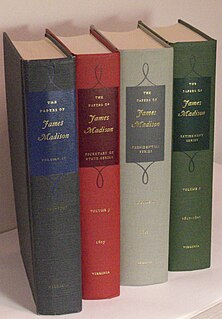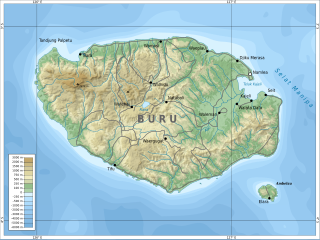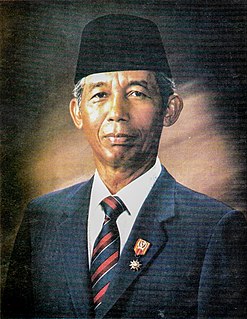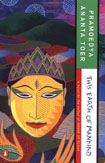
The Alexandria Quartet is a tetralogy of novels by British writer Lawrence Durrell, published between 1957 and 1960. A critical and commercial success, the first three books present three perspectives on a single set of events and characters in Alexandria, Egypt, before and during the Second World War. The fourth book is set six years later.

A tetralogy, also known as a quartet or quadrilogy, is a compound work that is made up of four distinct works. The name comes from the Attic theater, in which a tetralogy was a group of three tragedies followed by a satyr play, all by one author, to be played in one sitting at the Dionysia as part of a competition.

Buru is the third largest island within Maluku Islands of Indonesia. It lies between the Banda Sea to the south and Seram Sea to the north, west of Ambon and Seram islands. The island belongs to Maluku province and includes the Buru and South Buru regencies. Their administrative centers, Namlea and Namrole, respectively, have ports and the largest towns of the island. There is a military airport at Namlea which supports civilian cargo transportation.

Pramoedya Ananta Toer was an Indonesian author of novels, short stories, essays, polemics and histories of his homeland and its people. His works span the colonial period under Dutch rule, Indonesia's struggle for independence, its occupation by Japan during the Second World War, as well as the post-colonial authoritarian regimes of Sukarno and Suharto, and are infused with personal and national history.

General of the Army (Ret.) Abdul Haris Nasution was an Indonesian army general. Born into a Batak Muslim family in the North Sumateran village of Hutapungkut, in what was then the Dutch East Indies, he studied teaching and enrolled at a military academy in Bandung. After Sukarno declared Indonesia's independence on 17 August 1945, Nasution joined the fledgling Indonesian armed forces which was fighting the Indonesian National Revolution against the Dutch. The following year he was appointed commander of the Siliwangi Division, the guerrilla unit operating in West Java. After the country's internationally recognised independence in 1949, Nasution was appointed Chief of Staff of the army. He remained in post being suspended in 1952 following a failed show of force against the president. He was reappointed Chief of Staff in 1955. In 1965 there was a coup attempt by the 30 September Movement. Nasution's house was attacked, and his daughter killed, but he managed to escape scaling a wall and hiding in the Iraqi ambassador's residence.

Suharto resigned as president of Indonesia on 21 May 1998 following the collapse of support for his three-decade-long presidency. The resignation followed severe economic and political crises over the previous six to twelve months. Vice president B. J. Habibie took over the presidency.

Adam Malik Batubara was an Indonesian politician and former journalist who served as its third vice president. Previously he served as the parliament speaker, foreign minister, and president of the United Nations General Assembly.

Sudharmono was an Indonesian politician and military officer. He served as its fifth vice president between March 1988 and March 1993.

Indonesia's transition to the New Order in the mid-1960s, ousted the country's first president, Sukarno, after 22 years in the position. One of the most tumultuous periods in the country's modern history, it was the commencement of Suharto's 31-year presidency.

The Post-Suharto era in Indonesia began with the resignation of authoritarian president Suharto on 21 May 1998. Since the resignation of Suharto, the country has been in a period of transition known as the Reform era. This period has been characterised by a more open and liberal political-social environment.

Ayu Utami is an Indonesian writer who has written novels, short-stories, and articles. Saman (1998) is widely considered her masterpiece. It was translated into English by Pamela Allen in 2005. By writing about sex and politics, Utami addressed issues formerly forbidden to Indonesian women, a change referred to as sastra wangi.

This Earth of Mankind is the first book in Pramoedya Ananta Toer's epic quartet called Buru Quartet, first published by Hasta Mitra in 1980. The story is set at the end of the Dutch colonial rule and was written while Pramoedya was imprisoned on the political island prison of Buru in eastern Indonesia. The story was first narrated verbally to Pramoedya's fellow prisoners in 1973 because he did not get permission to write. The story spread through all the inmates until 1975 when Pramoedya was finally granted permission to write the detailed story.

Amir Machmud (Cimahi, West Java, 21 February 1923 – Bandung, West Java, 21 April 1995 was an Indonesian Military General who was an eyewitness to the signing of the Supersemar document transferring power from President Sukarno to General Suharto.
Joesoef Isak was an Indonesian publisher, translator, and left-wing intellectual. He was an advocate of free speech during President Suharto's authoritarian New Order administration, and was imprisoned from 1967 to 1977 without trial. In 1980, he helped found and direct the publishing house Hasta Mitra, publisher of Pramoedya A. Toer's Buru quartet.

Willibrordus Surendra Broto Rendra, widely known as Rendra or W. S. Rendra, was an Indonesian dramatist, poet, activist, performer, actor and director.
Nobertus Riantiarno is an Indonesian actor, director, and playwright. Beginning his acting while in high school, he studied under Teguh Karya, acting in several movies and plays, until eventually establishing his own theatre troupe, Teater Koma, in 1977. His works, with their highly political messages, were often censored by Suharto's New Order government. In 1998 he won the SEA Write Award for his play Semar Gugat. In February 2021, a documentary movie is made about him & Teater Koma. The movie name is Gesturing Notations, directed by George Arif.

Tirto Adhi Soerjo was an Indonesian journalist known for his sharp criticism of the Dutch colonial government. Born to a noble Javanese family in Blora, Central Java, Tirto first studied to become a doctor but later focused on journalism. A freelancer since 1894, in 1902 he was made an editor of the Batavia based Pembrita Betawi. Tirto established his first newspaper in 1903 and, four years later, created Medan Prijaji as a medium for educated native Indonesians. This proved his longest-lived publication, lasting over five years before Tirto was exiled in 1912 to Bacan for his staunch anti-colonial criticism.

Footsteps is the third novel in the Buru Quartet tetralogy by the Indonesian author Pramoedya Ananta Toer. The tetralogy fictionalizes the life of Tirto Adhi Soerjo, an Indonesian nobleman and pioneering journalist. This installment covers the life of Minke – the first-person narrator and protagonist, based on Tirto Adhi Soerjo – after his move from Surabaya to Batavia, the capital of Dutch East Indies. The original Indonesian edition was published in 1985 and an English translation by Max Lane was published in 1990.
The Chinese in Indonesia, Indonesian: Hoakiau di Indonesia, is a book by Pramoedya Ananta Toer published in 1960 by Bintang Press. In the book, Toer criticized discriminatory policies imposed on Chinese Indonesians. The book is based on a series of articles published on the front page of Jakarta's biggest selling daily newspaper at the time: Bintang Timur, published by Hasyim Rahman.
House of Glass is the fourth and final novel in the Buru Quartet tetralogy by the Indonesian author Pramoedya Ananta Toer. The original Indonesian edition was published in 1988 and an English translation by Max Lane was published in 1997.














